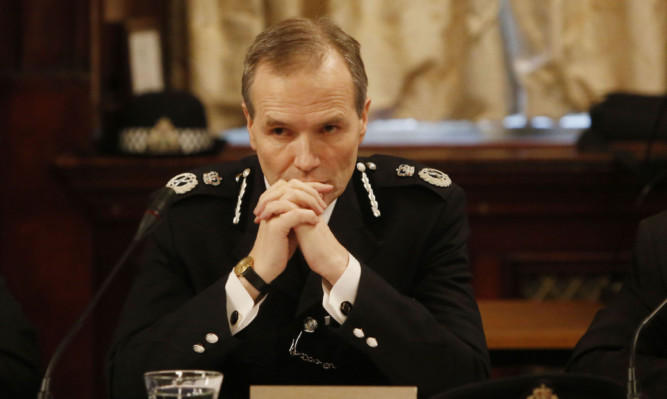Scotland’s chief constable Sir Stephen House yesterday pleaded with ministers to ease some pressure on the force’s over-stretched resources by scrapping its “unfair” VAT bill.
The nation’s top police officer launched a scathing attack on the Treasury for effectively taking £24 million out of the single force’s budget this year through VAT when no other police force in the UK and Northern Ireland faces the same problem.
And with that in mind, he called on Scotland’s new troupe of MSPs at Westminster to make the issue one of their top priorities in the new Parliament.
Sir Stephen told delegates at the Association of Scottish Police Superintendents (ASPS) annual conference at Tulliallan yesterday that maintaining local policing in the face of “crippling” budget cuts was an “ongoing daily challenge”, but insisted that VAT exemption would undoubtedly free up some cash which could be put to good use elsewhere.
“What on earth is going on with VAT in this country?” he said.
“Why are we the only police service in the United Kingdom that I’m aware of that pays VAT?
“How can that be right?
“It simply isn’t correct, it’s not right, it’s unfair and it shouldn’t be allowed to continue.
“In the coming year we will be liable for a VAT bill of about £24 million.
“The National Crime Agency, which provides a national service, is not charged VAT; the Police Service of Northern Ireland is not charged VAT; and none of the forces in England and Wales are charged VAT.
“I know there are people from the Treasury who will come up with explanations as to why we’re slightly different, but looking at the simple fairness of it, it does not add up.
“We look to the government to make use of the mandate they’ve been given by the Scottish public, and it’s a mandate that’s hard to deny with 56 MPs out of 59.
“I’m not suggesting this is the first thing they should be asking, but I’d like it to be on their list.
“That would do an awful lot to help us deliver the right police service for Scotland.”
Since the formation of the single force two years ago, Police Scotland has been forced to cut its budget by £68 million in year one and again by £64 million in year two.
The figure for year three, this current financial year, is expected to be around £55 million, and that has raised concern among police leaders that officers are struggling to cope with an increased workload.
Sir Stephen conceded that the SNP’s flagship commitment to keeping 1,000 more officers than they inherited in 2007 the much-vaunted ‘political’ benchmark of 17,234 – had put extra pressure on budgets, also noting that the force’s inability to impose compulsory redundancies and inability to outsource were also key constraints.
But he refused to criticise the policy publicly yesterday, despite concerns raised by ASPS president Niven Rennie about the effect the desire to maintain numbers at the current level was having on the service as it is.
Sir Stephen added: “Not everyone will agree but in maintaining the extra 1,000 officers, we have the ability to properly resource local policing teams and specialist units.
“It’s tough to do both, but I shudder how much tougher it would be if we didn’t have 1,000 extra police officers.
“We would simply fail.
“We need to balance the workforce, we need a sustainable budget, but I don’t believe the answer to that is reducing police officer numbers.
“I believe the answer to that is having a budget that is reasonable, and that we can work with it.
“I don’t particularly want to lead an organisation that has compulsory redundancies.
“Frankly losing staff, and we’ve lost many hundreds of staff through voluntary redundancy and early retirement, is painful enough.
“It may be voluntary from both sides, but the reality is that it is still a shock and a wrench for people to leave.
“Moving to compulsory redundancies would be unacceptable.”
Justice secretary Michael Matheson described the current situation regarding VAT on Police Scotland as “completely unacceptable” and said he had already had discussions with the 56 SNP MPs now at Westminster to ensure it was on their radar.
“The BBC don’t pay VAT they are a national service,” he explained.
“There are already national agencies in England and Wales that don’t pay VAT.
“This has nothing to do with legislation, this is purely a policy issue that could be changed with the stroke of a pen by the Chancellor.
“We’re not going to let up on this issue because we know the significant benefits that would come from that VAT change.
“I don’t believe we should be in a situation where we continually have to fill the gap due to policy decisions that are made elsewhere that have financial consequences for us.
“We’ll be continuing to pursue this with the Treasury and the Home Secretary, and you can be assured that we’re not going to be taking our eye off the ball on this matter.”
